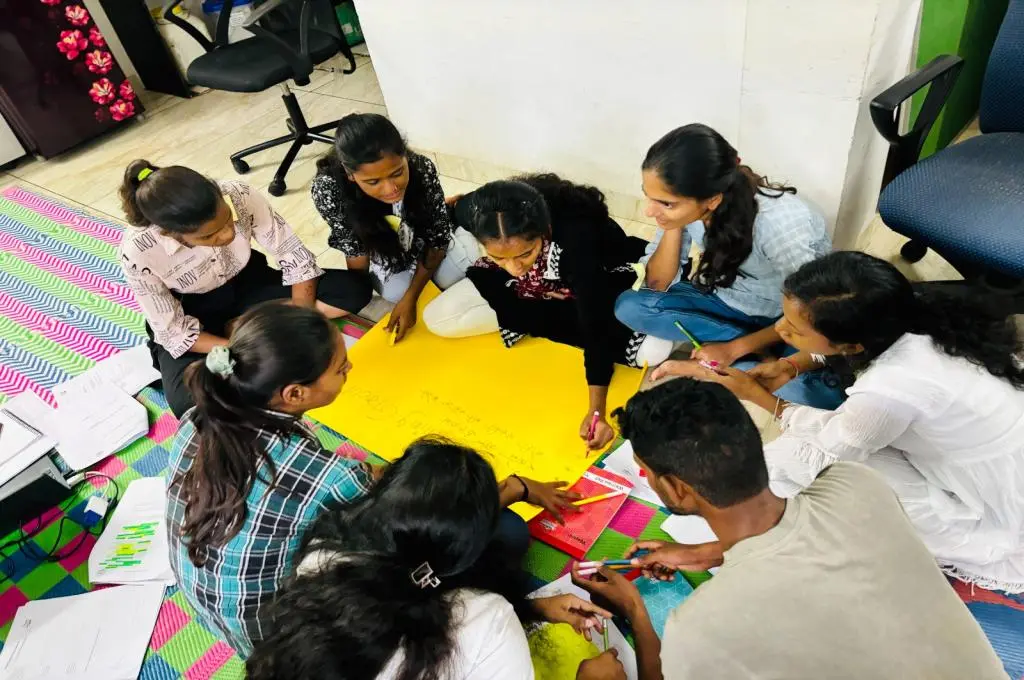For most 17-year-olds growing up in a family, the prospect of turning 18 is filled with anticipation and excitement. Becoming an adult is not just a milestone; it is a gateway to independence and responsibilities. One looks forward to casting their vote for the first time, opening an independent bank account, getting a driving license, and most importantly, taking their first steps towards a career by applying for higher education or looking for a job. Throughout this journey, they have the much-needed support and guidance of their family.
But for a 17-year-old who has grown up in a childcare institution (CCI), turning 18 can look very different. It marks the end of their stay in a place they have known as home for many years, if not their entire childhood, and separates them from the only ‘family’ they might know. They are suddenly thrust into an unfamiliar world, left to fend for themselves with minimal, or sometimes no, support and guidance from elders. Unless, that is, they are offered aftercare—a vital support system designed to help them transition into adulthood.
The legal framework of aftercare support
Aftercare plays a critical role in supporting such young adults—also known as care leavers—as they transition from institutional care to independent life. In India, institutional care is provided to children requiring care and protection, as well as those in conflict with the law. Recognising their continued need for structured support, the Juvenile Justice (Care and Protection of Children) Act, 2015, or the JJ Act, provides aftercare services for care leavers between the ages of 18 and 21.
Section 46 of the act states that any child leaving a CCI upon turning 18 may be granted financial support to facilitate their re-integration into mainstream society, if needed. To operationalise this, rule 25 of the Juvenile Justice (Care and Protection of Children) Model Rules, 2016, requires state governments—through the district magistrate and District Child Protection Unit—to develop aftercare programmes. These programmes must include provisions for continued education, skill development, job placement, safe housing, and financial support.
The rule further stipulates that the support may be extended up to the age of 23 in exceptional circumstances, such as for those who haven’t completed their education or who lack accommodation. Care leavers with physical or intellectual disabilities may also need support for longer periods.
Mission Vatsalya, a flagship scheme of the Ministry of Women and Child Development aimed at protecting and supporting children, provides financial support of INR 4,000 per month per child to CCIs, organisations, or individuals offering aftercare support. The scheme also encourages state governments to provide additional financial support to young adults. For example, in Chhattisgarh, care leavers receive financial support of INR 4,000 under Mission Vatsalya in addition to INR 3,000 under the state’s Mukhyamantri Bal Uday Yojana.
Together, these provisions establish aftercare not as a discretionary benefit but as a necessary extension of care—one that bridges the gap between childhood and adulthood for some of the most vulnerable young people in society. However, significant implementation gaps on the ground and lack of support for care leavers mean that many of their challenges remain unaddressed.
Challenges faced by care leavers
1. Inadequate preparation for independent living
A CCI, as defined by the JJ Act, is a facility where children in need of care and protection, as well as those in conflict with the law, may be placed—either temporarily or long-term—when family-based care is not possible. Children who are orphaned, abandoned, surrendered, or whose families are unable or deemed unfit to care for them often remain in institutional care for extended periods. Section 53 of the act directs CCIs to provide services to support children’s rehabilitation and social re-integration, including basic necessities, appropriate education, vocational training, life skill education, mental health interventions, and assistance with securing identity documents.
However, most CCIs are able to provide only the basics—food, clothing, shelter, and education in nearby government schools—due to limited funding and a shortage of trained staff. As a result, essential independent living skills—for instance, financial literacy, time management, decision-making, and effective communication—are often underdeveloped among children who have spent extended periods in institutional care. These are skills that children growing up in families typically acquire organically by the time they turn 18. This lack of preparedness leaves care leavers struggling to manage daily life, maintain employment, and handle financial responsibilities, which significantly increases their risk of being unable to sustain themselves independently.
2. Limited educational opportunities
Children in institutional care experience disruptions in their schooling due to frequent transfers between CCIs, lack of consistent academic support, or emotional distress arising from their circumstances. As a result, they may struggle to keep up with academic requirements or drop out of school altogether, unable to complete even grade 10 or grade 12. This severely limits their future opportunities. Without basic educational qualifications, they may find it difficult to access higher education, vocational training, or stable employment. This not only narrows their career prospects but also impacts their self-esteem and confidence, making it even harder to navigate adulthood independently.
3. Lack of awareness and access to support
Children growing up in institutional care often have limited awareness of the opportunities and support systems available to them after they exit care, including aftercare services meant to support their transition into adulthood. A 2019 study by Udayan Care found that 67 percent of surveyed care leavers were unaware of aftercare provisions, while approximately half had not been involved in preparing their individual care plans (ICPs)—personalised development plans designed to support a child’s overall well-being and rehabilitation within the juvenile justice system. The staff in many CCIs lacked clarity on how to effectively prepare these plans.
4. Unavailability of safe and affordable housing
One of the most pressing challenges faced by care leavers is securing safe and affordable housing after leaving a CCI, a concern that is particularly acute for girls and young adults who are orphaned or have no family contact. The yawning gulf between the number of aftercare homes and CCIs across most states leaves many care leavers uncertain about where they will live once they age out of the system.
For instance, while Rajasthan has 234 CCIs, it has only 30 aftercare homes. With limited experience of independent travel or living outside a CCI, many care leavers are understandably hesitant to move away from where they are located. This hesitation, compounded by a lack of information and support, further restricts their access to higher education opportunities, skill development, and employment—most of which are concentrated in larger towns and cities.
5. Difficulty in obtaining identity documents
Obtaining essential documents related to proof of identity, age, or residence—such as Aadhaar card, PAN card, and birth certificate—remains a significant challenge for many care leavers. Having grown up in institutional care, they often lack family records or consistent documentation, making it difficult to establish their legal identity. These documents are crucial for accessing government social protection schemes, availing benefits under state reservation policies, exercising the constitutional right to vote, and opening a bank account for receiving financial assistance.
6. Lack of trusted guidance and mentorship
Many care leavers lack a trusted adult or mentor to turn to during critical moments of decision-making, such as accepting a job offer or choosing a life partner. Even when family connections exist, these relationships are often complex and strained. Families may lack the awareness or capacity to offer meaningful guidance, and in some cases, their involvement may be driven by self-interest rather than the well-being of the young adult. The absence of a reliable support system places a significant emotional and mental burden on care leavers, making it difficult for them to make informed and confident choices about their future.

7. Difficulties faced by care leavers with disabilities and those in conflict with the law
Care leavers with disabilities and those who have been in conflict with the law face compounded challenges that demand targeted and sensitive support. Care leavers with a history of conflict with the law are often burdened by stigma even after completing their stay in a CCI. This societal bias can limit their access to education, employment, and community acceptance, undermining their chances of a fresh start. The emotional toll of this exclusion, combined with the loneliness that often follows, makes access to counselling and mental health support essential for their re-integration.
Similarly, care leavers with disabilities face multiple layers of disadvantage, including a lack of specialised services such as assistive devices, inclusive education, or accessible housing. These intersecting vulnerabilities leave them particularly exposed to further marginalisation.
Strengthening aftercare support for India’s care leavers
Each year, approximately 50,000 young adults age out of institutional care in India, many without the skills, resources, or support systems needed to live independently. While the JJ Act mandates aftercare support to facilitate their re-integration into society, as detailed above, the implementation on the ground remains fragmented and inadequate, and a majority of care leavers remain unaware of the aftercare services available to them.
To truly support care leavers, we must reimagine aftercare as a continuum of care, starting within CCIs. Here are some recommendations for strengthening aftercare support in India.
1. Laying the groundwork: Preparatory planning in CCIs
Preparation for independent living must begin well before children age out of institutional care. CCIs should introduce life skills training by the age of 15 or 16, focusing on basic tasks such as cooking, budgeting, managing money, personal hygiene, using public transport, and accessing support services.
Before a child exits care, CCIs must prepare a detailed and personalised aftercare support plan aligned with the child’s aspirations and needs. Individual counselling should be made available to help children explore educational and vocational options tailored to their interests and aptitude.
Documentation readiness is also critical for access to welfare schemes. CCIs must ensure that every child has an Aadhaar card, PAN card, and other relevant identification before leaving care.
2. Leveraging data and technology
Technology can be leveraged to bridge the gap between care leavers and support systems. A centralised digital platform should be developed to connect care leavers with job opportunities, mentors, training programmes, and peer networks. Such a platform could also serve as a source of verified information on available government schemes and aftercare services.
States should also establish robust management information systems (MIS) to maintain comprehensive records of all young people exiting alternative care, including those from CCIs, foster care, kinship care, and sponsorship programmes. This would help ensure that aftercare services reach every eligible youth.
3. Expanding social protection and child support
Financial support for care leavers under Mission Vatsalya needs to be made universally accessible. In addition, the scope of support must be expanded to cover the need for education, skilling, and housing. This requires addressing the current shortfall in aftercare homes through increased state investment, especially to support care leavers without family or community support systems.
A further step would be to include explicit provisions for care leavers in social protection schemes at both central and state levels.
4. Collaborating for impact
Aftercare requires a coordinated effort across government, civil society, and the private sector. Programmatic collaboration and knowledge sharing are essential to developing scalable models of aftercare support. Nonprofits must work alongside government systems to bridge existing gaps in service delivery and ensure no young person is left behind.
CCIs can support the development of individual aftercare plans and mentor care leavers—through dedicated staff or trained volunteers—helping them navigate the challenges of independent living with confidence and stability. Given the diverse range of challenges faced by care leavers, including those based on gender, disability, and past involvement with the juvenile justice system, interventions must be sensitive to these realities, offering specialised services where needed.
Corporates can play a vital role by offering not only skill development opportunities but also housing assistance and job-readiness training. Private sector investment and CSR funding should be mobilised to develop and scale holistic aftercare solutions. Long-term engagement with care leavers through these efforts can significantly improve their outcomes.
Effective aftercare is not a one-time intervention but a sustained process that requires early preparation, systemic coordination, and ongoing support. With the right investment and collective will, India can build an enabling ecosystem where every care leaver has the opportunity to thrive.
—
Know more
- Learn how the new foster care guidelines can succeed in India.
- Listen to this podcast to understand the state of care leavers upon leaving child care institutions.
- Learn more about the draft guidelines on de-institutionalisation, and what needs to change.
Do more
- Reach out to Catalysts for Social Action to learn about their comprehensive Aftercare support programme.






